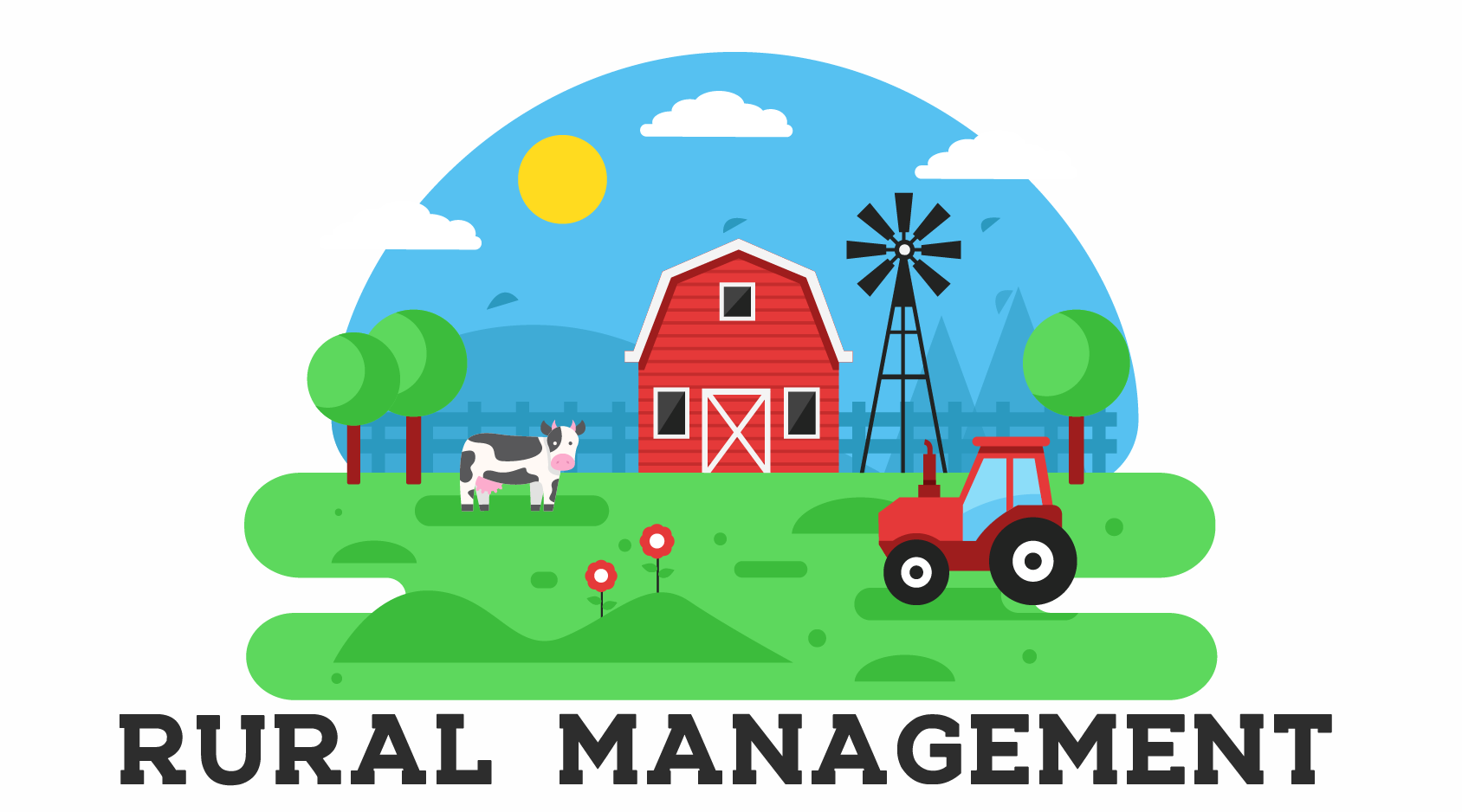Rural Management is a Post Graduate (PG) Master of Business Administration (MBA) course that involves planning and managing the advancements in Rural Areas. It refers to the study of the rural economy, agribusiness, planning, organizing & maintaining of the cooperatives, business in the rural areas, and of the related fields. The aspirants need to understand the realities of rural areas and commit to its development. As the curriculum of the course, for the practical knowledge, the aspirants are exposed to Rural areas, living with the rural peoples with their team for an internship where they gain direct experience of working in a Rural environment.

Highlights:
| Course Name | Rural Management |
|---|---|
| Course Level | Post Graduate (PG) |
| Duration | 2 years |
| Examination Type | Semester Type |
| Eligibility | A minimum of 45% of the aggregate mark in any stream of graduation |
| Top Recruiters | Amul, Nestle, National Dairy Development Board (NDDB), Mahindra Agri Solutions, etc |
| Top Career/Job Profiles | Rural Development Officer, Business Development Manager, Regional Manager |
Top Colleges
- Jamnalal Bajaj Institute of Management Studies (JBIMS), Mumbai
- Institute of Rural Management (IRMA), Anand
- KIIT School of Rural Management, Bhubaneswar
- Amity School of Rural Management, Noida
- Symbiosis Institute of Business Management (SIBM), Pune
- Department of Management Studies IIT Delhi
- ICFAI Business School, Hyderabad
- Christ University Institute of Management (CUIM), Bangalore
- Amrita School of Business, Bangalore
- CMS Business School, Jain University, Bangalore
- Xavier School of Rural Management, Bhubaneswar
Eligibility Criteria:
Candidates need to check their eligibility criteria before applying for an MBA in Rural Management. The detailed eligibility criteria are given in the table below:
| Course | Duration | Eligibility | Entrance |
|---|---|---|---|
| MBA in Rural Management | 2 years |
|
CAT, SNAP, MAT |
Syllabus:
The course is of 2 years and 4 semesters duration long. The detailed semester-wise syllabus is given in the tables below:
| Semester I | Semester II |
|---|---|
| Essentials of Management | Financial Management |
| Quantitative Methods in Business | Research Methodology |
| Human Resource Management | E-Commerce |
| Managerial Economics | Indian Financial System |
| Computer Applications & MIS | Management of NGOs & Action Research |
| Rural Society and Institutions | Rural Development: Concepts, Models and Programmes |
| Management of Social Empowerment | Management of Sustainable Agriculture |
| Financial & Managerial Accounting | Rural Markets and Marketing Management |
| Semester III | Semester IV |
|---|---|
| Business Laws | Organizational Effectiveness & Change |
| Environment and Natural Resource Management | Strategies for Sustainable Rural Development |
| Energy Requirement in Agriculture & its Management | Industry and Agri-Business |
| Management of Animal Husbandry, Dairying & Aquaculture | Rural Infrastructure |
| Watershed Management | High Tech Horticulture |
| Global Business Environment & Rural Development | Precisions Farming |
Admission Process:
The admission process for the course of MBA in Rural Management is basically based on the entrance examinations and then followed with a round of Group Discussion (GD) and personal interview, where the general aptitude for the course is being tested. The admission process generally varies across the colleges. There are also universities that provide direct admission based on the candidate’s performance at the level of graduation.
Skills Required:
- Must have the ability to work with clients having diverse interest
- Interest in managing, planning, etc.
- Willingness to work in rural areas
- Good communication skills
- Must be willing to learn the local languages
- Ability to handle masses
- Analytical skills
- Leadership skills
- Problem-solving ability
Top Entrances:
1. CAT (Common Admission Test)
- Minimum Qualification: Candidates must have passed graduation from a recognized university with a minimum of 50% marks in aggregate (45% for SC/ST)
- Exam Duration: 3 Hours
- Exam Mode: Online
2. SNAP (Symbiosis National Aptitude Test)
- Minimum Qualification: Candidates must have passed graduation with a minimum of 50% marks in aggregate (45% for SC/ST)
- Exam Duration: 1 Hour
- Exam Mode: Online
3. MAT (Management Aptitude Test)
- Minimum Qualification: Candidates must have passed graduation from a recognized university
- Exam Duration: 2.5 Hours
- Exam Mode: Online and Offline
- Minimum Qualification: Candidates must have passed graduation or its equivalent from a recognized university
- Exam Duration: 3 Hours
- Exam Mode: Online
5. GMAT (Graduate Management Aptitude Test)
- Minimum Qualification: Candidates must have passed graduation or its equivalent from a recognized university
- Exam Duration: 3.5 Hours
- Exam Mode: Online
6. CMAT (Common Management Admission Test)
- Minimum Qualification: Candidates must have passed graduation or its equivalent from a recognized university with a minimum of 50% marks in aggregate (45% for SC/ST)
- Exam Duration: 3 Hours
- Exam Mode: Online
7. IBSAT (ICFAI Business School Aptitude Test)
- Minimum Qualification: Candidates must have passed graduation or its equivalent in the medium of English with a minimum of 50% marks in aggregate
- Exam Duration: 2 Hours
- Exam Mode: Online
Career and Job prospects:
After completing MBA in Rural Management, one can get job opportunities at various Rural Banks, Food Industries, Insurance corporations, etc. Different types of job roles for this course are mentioned in the table below:
| Job Profile | Average Salary Per Annum |
|---|---|
| Rural Development Officer (RDO) | 3 - 5 Lakh Rupees |
| Rural Executives | 4 - 6 Lakh Rupees |
| Business Development Manager | 5 - 6 Lakh Rupees |
| Regional Manager | 9 - 10 Lakh Rupees |
| National Sales Development Manager | 11 - 12 Lakh Rupees |
| Operation Manager | 7 - 8 Lakh Rupees |
| HR Manager | 5 - 7 Lakh Rupees |
| Sales Officer | 3 - 5 Lakh Rupees |
Employment Areas:
- Banks
- Insurance companies
- Rural and Agriculture financing
- Research & consultancy firms
- Finance institutions
- Food industries
- Tata Teleservices
- Multinational Corporations (MNCs)
Top Recruiters:
- Amul
- Indian multinational conglomerate (ITC)
- Nestle
- ICICI Bank
- Gramin Banks
- HDFC Bank
- National Dairy Development Board (NDDB)
- Godrej Industrial Limited
- Mahindra Agri Solutions
- Mapro Foods
- Dabur India Ltd.
- Seva Mandir
- Nandi Foundation
- Self-Employed Women's Association (SEWA)
- Bharatiya Agro Industries Foundation (BAIF)
Top Hiring Cities in India:
- Gurugram
- Hyderabad
- Bengaluru
- Ahmedabad
- Udaipur
- Pune
- Anand
- Mumbai
- Noida
- Patna
FAQs:
Q: What is Rural Management?
A: Rural Management is the study of the rural economy, agribusiness, planning, organizing & maintaining of the cooperatives, business in the rural areas, and of the related fields.
Q: What is the average salary of a Rural Development Officer (RDO)?
A: The average salary ranges from 3 - 5 lakh rupees per annum.
Q: What are the best colleges for MBA in Rural Management?
A: Top colleges providing MBA in Rural Management are:
- Jamnalal Bajaj Institute of Management Studies (JBIMS), Mumbai
- Institute of Rural Management (IRMA), Anand
- KIIT School of Rural Management, Bhubaneswar
- Amity School of Rural Management, Noida
- Symbiosis Institute of Business Management (SIBM), Pune
- Department of Management Studies IIT Delhi
- ICFAI Business School, Hyderabad
- Christ University Institute of Management (CUIM), Bangalore
Q: What is the basic eligibility criteria for MBA in Rural Management?
A: To apply for MBA in Rural Management, the candidate should have completed the graduation or its equivalent from a recognized university.











